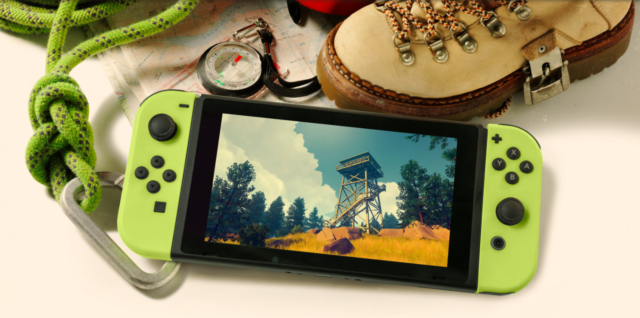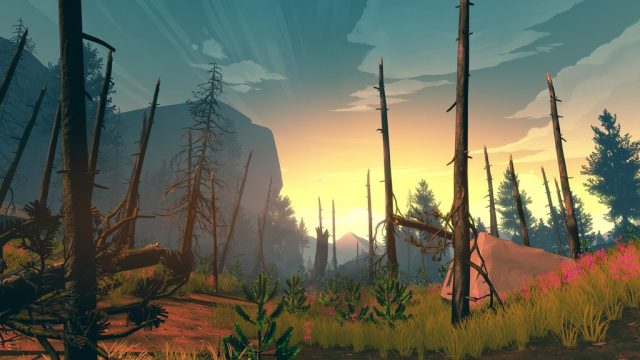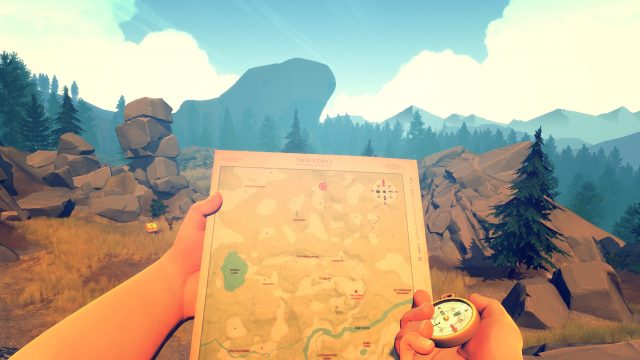Powerful narrative; great use of sound; performances are realistic and engaging
Performance issues including some framerate slowdown and pop-in; the game glitched and killed over an hour of playtime, as a result
Welcome to Backlog Reviews! These are reviews of slightly older games that many people might have sitting around waiting to be played or still considering purchasing. Come get the lowdown on what might be worth playing as we all shelter in place and ride out this pandemic together!
Firewatch caught my attention when I’d read that developer Campo Santos would be stripping the title down to “the studs” and reworking it for Nintendo Switch. The game was already a hit when the Switch version was announced, so I thought it was pretty cool that Campo would be putting so much effort into optimizing Firewatch for the under powered (compared to its competition) console. That said, it’s been over a year since Firewatch landed on the platform and I’d yet to give it a download until this past weekend. My relationship with games is weird. Sometimes, I’ll start up a title and power through it in just a couple of days. Other times, I’ll hem and haw, stretching a game out over months before completing it.
I beat Firewatch in a night.
Does that mean Firewatch isn’t a very long game? That’s… tricky to answer. My playtime clocked in between five and six hours. I think I might have stopped to get a snack once and another to use the bathroom. Beyond that, my play session was relentless, because Firewatch was that damned engaging. The reason it’s tricky to say if Firewatch is a short game is because it’s going to offer players a different experience each time depending on the dialogue choices that they make. There are plenty of games that employ this sort of branching narrative, but Firewatch does it in a way that feels very fresh and unique.
Let’s answer the first question before moving on: Firewatch is as short as the player wants it to be. Push through once and see the credits roll in a few hours. Take some time to bask in the wonder of its narrative and gameplay, however, and Firewatch will take on much greater length the more its played. To be clear, the actual story of Firewatch isn’t impacted by the player’s choices, but rather the relationship between protagonist Henry and his ever present companion Delilah is what’s altered. How close or distant Henry and Delilah grow varies based on the dialogue selected by players. Yet, no matter how much the player might long to see a particular outcome occur between the pair, Firewatch always reaches the same inevitable ending.
Firewatch takes place during the summer of 1989 in Shoshone National Forest in northwestern Wyoming. Henry has taken on the job of a fire lookout, someone who must stay posted in the woods keeping an eye open for any fires (or trouble) that might spring up. The significance of Firewatch being set in 1989 is that Yellowstone National Park had suffered the worst firestorm in its history the year prior. There’s a small tinge of danger in the air from the outset knowing that Henry is watching the Shoshone at a time when so much has already been lost. Loss, incidentally, being a central theme throughout the entirety of Firewatch.
Henry has found himself in the woods during an incredibly trying time with his wife Julia. I won’t provide any real story spoilers in this review, but I will say that the relationship between Henry and Julia is established at the beginning of the game and will largely color the player’s initial opinion of Henry during their first playthrough. The story begins in medias res, with Henry already on his way to the Shoshone as the game fires off the circumstances that led him there. Players are free to pick their own version of the events, but in the end the “why” of Henry’s journey to the woods always leads to the same setup: he’s alone and trying to escape his problems.
How much of a sinner or saint Henry is rests on the decisions the player makes, but it’s here that Campo really does a powerful job of affirming that Henry is no innocent. He’s a man with very realistic and relatable flaws. Video games are as guilty as any other form of entertainment of presenting black and white scenarios of “good guys and bad guys,” but in Firewatch the player is disillusioned of such notions almost immediately. This extends to Delilah, Henry’s boss and confidant throughout the summer. She drinks too much and takes a shine to Henry almost immediately, despite knowing that he’s married. The pair’s exchanges begin innocently enough, but as the game progresses Delilah and Henry’s attraction can range from mild to flourishing depending on what route the player chooses to go.
Henry and Delilah were portrayed by voice actors Rich Sommer and Cissy Jones, and the two did an amazing job bringing their respective characters to life. Rich doesn’t sound much like the average, generic video game hero— he never knows exactly what to do next and his voice is one of an average man, not some grizzled warrior. It’s easy to root for Henry even at his weakest. Delilah didn’t click for me. Half the narrative is centered around Delilah and the connection that she forms with Henry, but considering Firewatch takes place from the first-person view through Henry’s eyes, I couldn’t help but internalize his plight as my own. The polite way of putting it is that Delilah isn’t my cup of tea, so I wasn’t all that interested in making her Henry’s, either. This took some of the uncertainty away from the dialogue choices I made; since I didn’t really fancy Delilah on my end, I wasn’t able to have Henry reciprocate her advances (or initiate his own).
I suppose if there’s a weak link in Firewatch’s narrative it’s not that Cissy’s performance was lacking (again, she was exceptional), it was that for all the seeming variance the game offers player’s in their dialogue options, it felt clear to me that there was a so-called right path to take. Basically, I walked away from Firewatch with the understanding that players were supposed to want to see Delilah and Henry get together by the end. Admittedly, I might be totally wrong about this; someone could interpret their relationship completely differently than I have and I can think of many reasons why they would. Still, after having played numerous narrative-driven games in my time, I nonetheless feel like there’s a certain expectation for player’s to lean a particular way during Firewatch. If Henry and Delilah’s circumstances could have been truly up in the air, it might have made for an even more interesting end.
Don’t get me wrong, though— the ending is strong. Very strong. There’s a reason I played into the wee hours of the morning the night I fired up the game for the first time. Firewatch mesmerizes. What starts with a small disagreement at a lake between Henry and some drunken girls escalates into an absolute thriller with real stakes. Campo handles the mystery at the heart of Firewatch with deft hands that never drop the ball. No story beat overstays its welcome and I was genuinely surprised by what happens throughout (for the most part). All of this is supported by some fine production values. Through visuals and audio, Campo Santos delivers players into the heart of the Shoshone. The sound was especially impressive. Pumping through the speakers of my stereo, the chirping of birds and crunching of branches and leaves underfoot as I plodded my way around the map really stood out. The small bits of orchestral score that accompanies the gameplay was also perfectly implemented. It served to heighten exactly the right moments in the story.
Visually, Firewatch is a stylized take on the natural world. It’s quite picturesque but doesn’t strive for absolute realism. I’ve never been on a long hike through a forest, but Firewatch made me feel as though I was legitimately stomping through the woods. It’s not without some performance hiccups, however. Despite optimizing Firewatch for Switch, the game nevertheless chugs here and there. Pop-in is also frequent, but perhaps more grating was getting trapped in random bits of environmental geometry. By necessity Firewatch blocks off access to some areas with deliberately placed trees and rocks. As a plus, this design choice necessitates the use of the handy map and compass that players will depend on to get around. Unfortunately, there were too many times where I found myself perplexed that low steps and small branches were impeding my path.
There also weren’t enough opportunities to venture aimlessly throughout the game environment. Now, there is an entire mode dedicated to free-roaming, but in the actual narrative itself things play out rather linearly. It’s no sin— Campo had a story to tell and that story is the centerpiece of this game above all else. That didn’t prevent me from wanting more objectives outside the boundaries of the narrative, sadly. In fairness, Campo does sprinkle in a bunch of stuff to find throughout the park, so when the game offers chances to break off and wander, players are rewarded for doing so. There are sights that won’t be seen unless the player ventures beyond the beaten path, so for those who want to see it all, know that it’s not a fruitless effort.
It’s rare that I’ll find the sense of immersion in a game completely broken, but there were moments that I couldn’t get Henry back on track that really left me vexed. Throw in losing over an hour of playtime to the game freezing and there were enough technical blemishes on display to slightly mar my time at Shoshone. Snippets of dialogue also failed to capture the feel and sound of people speaking to each other in the ’80s. Overall, though, Firewatch is one to remember. It sets out to tell a story and does it astoundingly well. I found myself melancholy when all was said and done, and although I’ll likely never get to hear more about the lives of Delilah and Henry, I’m grateful for the summer I got to spend with the two of them. Firewatch seems to want players to understand that sometimes, life is about the moments you’ll never get back, the decisions you can never unmake. I’m glad I chose to spend that night in the woods with Campo Santos’ inspired first effort.




 ShareThis
ShareThis








